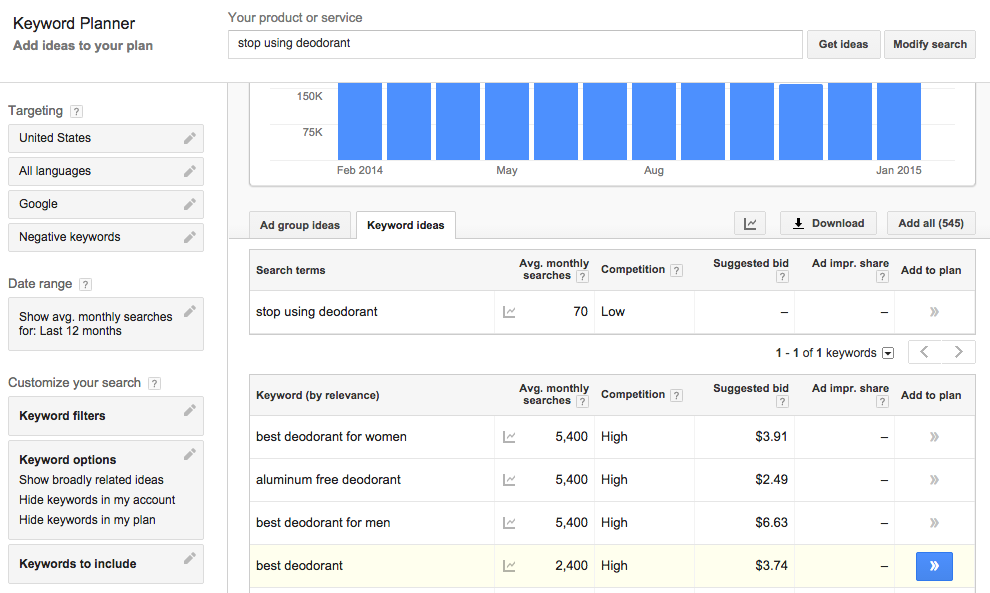 I’ve had this website since June of 2013. I also have a couple other sites from which I can draw data from. One thing that has always made me giggle was looking at the random pages that brought me traffic. One of the more interesting things about blogging is that most often, the unexpected happens.
I’ve had this website since June of 2013. I also have a couple other sites from which I can draw data from. One thing that has always made me giggle was looking at the random pages that brought me traffic. One of the more interesting things about blogging is that most often, the unexpected happens.
Take for example this blog. I’ve written about many different topics on here and sometimes I would write with the expectation of ranking for a certain term in Google. Sometimes it works out, other times it doesn’t. Other times however, I wind up ranking for stuff that I had no intention of ranking for, and it comes out of nowhere.
Last year, I wrote a post on a little experiment I did in which I went a week without deodorant. As it turns out, this post gets me more random Google traffic than anything else I’ve written for the site.
How I found out about this
The way you can easily find out about what is bringing you traffic is to just go into Google Analytics and clicking on the acquisition tab on the left. Under Acquisition, click on search engine optimization and look at the top results. The top ten results are all variants on keywords about 30 days of discipline or going without deodorant. Analytics will also show you your average rank for that keyword. Sure enough, most of the keywords bringing me traffic I’m ranking for in the top 4.
I didn’t look this up on Google Analytics until after I started getting a bunch of comments on my deodorant article. The comments fell into two categories, either someone calling me a complete asshole or someone talking about how they did the same thing as me and agreeing with me. I started wondering why I was getting a bunch of comments on an article that was from last year. It was only then that I did a little digging and found out that I was ranking for all this stuff.
Then it occurred to me that my other sites could naturally be ranking for certain keywords. I clicked on over to my other site Viking Smash Brewing and looked at what was getting the most comments. Sure enough, one article was getting more comments than anything. I made an article on a 1 gallon cyser recipe and it started ranking for “1 gallon cyser recipe”.
How you can use this
The first thing I did after finding out about all these random keywords I was ranking for was to see how much average search traffic these keywords had per month. I fired up the old Google Adwords Tool and did a search for the keywords I was ranking for.
You’ll notice that stop using deodorant gets 70 average monthly searches. That’s not a lot. However, if you consider that I did absolutely nothing to rank for this term besides just writing an article, it’s not too bad. I am ranking #1 for this search term and a huge percentage of people who search for that are clicking on my site. I’m also ranking #1 or near the top for a bunch of related search terms to not wearing deodorant.
At first when I discovered this I laughed and made a quip that I should start a niche site around not wearing deodorant. While I was only half-joking, I’ll bet someone out there could actually pull that off. My next thought was maybe there was some way to monetize that specific article by putting affiliate links for a natural deodorant alternative.
Then, I had the thought of making a couple other articles on the same subject to get even more traffic around the same issue, only this time making damn sure to put some links in for some products.
While this sounds really dumb talking about not wearing deodorant, it makes a lot more sense when talking about 1 gallon cyser recipes.
The formula:
- Blog for a while and find out what is naturally ranking for you.
- Once you find out what you can rank for easily and will bring in search traffic, start crafting more articles around that subject.
- Put affiliate links in those articles.
The magic of crafting articles around a long tail keyword you are already ranking for is that if you start ranking for enough related keywords, eventually you will start ranking better for main keywords. For example, let’s say I write a bunch of recipe articles on Viking Smash Brewing to rank for a bunch of 1 gallon recipe keywords. Assuming my articles are ranking for a bunch of those keywords, eventually I should start ranking better for a keyword like “cyser” or “mead”. This is how your traffic starts getting exponentially bigger with the more good content you produce.
Why this is important
The key to take away from this article is that if you are already ranking for something naturally, meaning without doing any kind of black hat SEO sorcery, it stands to reason that you could rank pretty easily for that same subject with other content.
This takes some of the guess-work out of Keyword Research. Keyword research is important, but if you are already well into blogging without doing any, take a moment to see where you are already ranking to get a good idea for content in the future. Then, ask how it was that you managed to rank for that term?
Try and backward engineer how you can rank for a term and either apply it again to new content for that term or use it to rank for other terms.
After you figure everything out, my next move would be to start trying to think of keywords to rank for that will:
- Bring a decent amount of traffic
- Be relatively easy to rank for, merely by posting your article
- Centered around products that you can recommend
- Centered around products that are expensive to get a good return on the commission
This is how you go about writing an article and making money from it for years to come. All the ways that this blog has brought in money usually has to do with articles that are a “review”, “how to”, or “guide”. For this blog I don’t think it would be prudent to write every day geared towards making some affiliate money. That’s not really the full intent of this site. For my niche site on the other hand, I’d say it’s a great idea.
For your own sites, decide accordingly.
Conclusion
I was tickled at the fact that the article that brings me the most traffic was a goofy experiment I did last year. I imagine that a lot of other bloggers have had a similar experience.
Use this knowledge to your advantage.
-Tate
Check me out on Twitter
Follow @Tatetime


Recent Comments